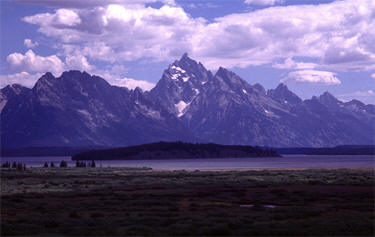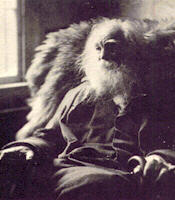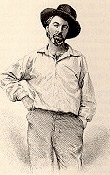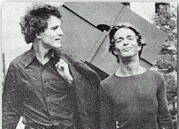 |


|
|
The Poet of Comrades and of Love |
|
By Jack Nichols
Its the first such attempt to hoist high a banner on behalf of Whitman's Leaves of Grass by a prominent 60s-70s' gay activist. Lige Clarke, who, with me, had co-authored the first non-fiction memoir by a male couple: I Have More Fun with You Than Anybody (St Martin's Press, 1972) joined me on this particular morning speaking on stage and later that day, together, in the nearby Rocky Mountains, we danced from boulder to Boulder surrounded by handsome crowds of lesbian and gay lib university students. Our first book, celebrating love and friendship, had used the following quotation from Walt Whitman's Leaves for its inscription: “And no man understands any greatness or goodness but his own, or the indication of his own.” I've been active in the gay liberation movement since I was in my early twenties. The intervening years have been exciting ones for me: the first picket line in front of the White House, TV and radio appearances, debates with old-fashioned psychiatrists and clergymen, confrontations with officials of the U.S. government, political campaigns, writing a book, editing a gay newspaper, and, more exciting than any of these, sharing, for the last nine years, the companionship of an extraordinary man! This morning, in fact, is a strange sort of culmination for me. It's my 35th birthday today, and here I am far from my home on the East Coast. This is the first time I've seen the Rockies. It's a great birthday present. I'm honored to be here.

After all this time, I'm expected to be an expert of sorts on homosexuality, and on homosexually-inclined people. My work has taught me more about homosexuality than most peoples' jobs, I suppose. You'd be surprised at the great changes I've seen in attitudes toward gay people in the last decade. I can remember the days when people asked me—as a public homosexual—if I had the sex organs of both sexes. Folks never tired of asking me who's the husband and who's the wife in my relationship. But all this sort of ignorance is starting to evaporate. Now that I'm 35 I can afford to start relaxing a bit. There are thousands of younger gay liberationists and they're taking the reigns where I left off, just as I took them up when those in an earlier generation left them for me. By yesterday's standards, gay liberation is new to the American public. It's new to media. But it's really a very old movement: one that extends back to the middle of the 19th century, or, if we were to peek into ancient times, we'd find plenty of famous homosexually-inclined poets and philosophers who let us know about their own integrity and who sang about the beauty of their homoerotic feelings. I haven't left the gay liberation movement. I'm still interested in seeing the social reforms go full speed ahead. I think everyone will benefit—both straight and gay—when these reforms are further along the road to accomplishment. I'm still interested in civil liberties and social rights. But unless it is a special occasion, once or twice a year, I don't feel that it's necessary for me to do as much marching anymore. I'm dispensable.
Since I've been learning to cultivate my own garden, I've unearthed cultural strains that certainly would not appeal to all homosexually-inclined people, but which do appeal to me, and which give me adequately, in fact, a satisfying perspective on my own sexual culture, and on that of others too. I've unearthed a giant—a cultural giant, and I'm intending to sound his name. He compliments my own vision as a homosexually-inclined man and compliments my own best sense of life. No homosexual, no matter what his breadth of experience, can speak for all other homosexually-inclined people, just as no heterosexually-inclined person can speak for all folks with his preferences. A friend of mine, a simplifier who likes categories, once told me that there were two types of homosexuals. He said there were Gideans—Protestant agonizers like Andre Gide—and there were Wildeans—after Oscar Wilde, the flamboyant. I told my friend that he'd left me out. I explained to him that I'm a Whitmanite. I see the American poet, Walt Whitman, as a great precursor and fountainhead of prophecies, visions and attitudes, both toward society and the self, that I feel are at the very basis of the movement I've been working to advance. Some of you may have picked up Whitman for a moment or two. Others of you may have found his erotic love poetry difficult to comprehend. The great grandfather of British gay liberation was Edward Carpenter (who wrote Love's Coming of Age—the big sex revolution book of its day--1900). Carpenter was an avowed disciple of Walt Whitman. He realized long ago, as I'm now rediscovering—that Walt was talking to anyone whose sense of curiosity and whose appreciation extended to those of the same sex. What did Walt Whitman write poems about? What was he saying? The truth is that he was not asking to be interpreted except by each individual who reads him—on an individual basis. Let me quote him:
You shall not take things at second or third hand, nor look through the eyes of the dead, Nor feed on spectres in books. You shall not look through my eyes either, nor take things from me. You shall listen to all sides and filter them from yourself.
Here, at the university of Colorado, it seems to me that a call for the re-examination of Walt Whitman's poems (in the light—not only of gay liberation—but of our whole changing sexual culture) is not at all out of place. He was among the first women's liberationists. The opening lines of Leaves of Grass say this:
He was the first major writer in western literature who re-introduced a buoyant, healthy, positive celebration of sexuality in his poems. In another poem Whitman wrote:
Through me forbidden voices, voices of sexes and lusts, voices veiled and I remove the veil, voices by me clarified and transfigured. My enthusiasm for Leaves of Grass would have been no surprise to Whitman himself. Many times in his poems he anticipated that the Leaves would be chanted by young men—loving comrades—and that centuries after his death he would still stir their hearts. He knew that men and women of the future would fall in love with him. He sings:
I will lift what has too long kept down those smoldering fires. I will give them complete abandonment. I will write the evangel poem of comrades and of love. For who but I should understand love with all its sorrows and joy? And who but I should be the poet of comrades? Whitman's hope to be understood and appreciated by his countrymen was not so misplaced as some critics ask us to believe. That he hasn't been understood is less his fault than the fault of the cultural conditioning—our lot—which has made understanding him more difficult. But I think there are signs today that we in America are ripe for a Whitman revival. He was a robust poet. He was totally affirmative. He said Yes to life. Many critics have found this throbbing enthusiasm of his hard to relate to. But literary critics are seldom what one might call physical people. Too often their minds seek fulfillment while their bodies do not. Whitman was the poet of the body.
 His contemporaries were still enclosed in 19th Century puritanism. Emerson tried to talk Whitman out of incorporating his very frank sexual poems into Leaves of Grass. As perceptive a man as he was, Emerson lacked Whitman's robustness because he began from another starting point. He saw the material world—our bodies—as a manifestation of spirituality. Whitman's emphasis arrived from the opposite direction. He realized that it is through the material world—through our bodies—that we experience spiritual awareness. It was Whitman's sexual awareness that separated him any other writer of his day, including Emerson, and gave his poems an earthy quality that the others lacked. Most writers have not yet caught up with him.
His contemporaries were still enclosed in 19th Century puritanism. Emerson tried to talk Whitman out of incorporating his very frank sexual poems into Leaves of Grass. As perceptive a man as he was, Emerson lacked Whitman's robustness because he began from another starting point. He saw the material world—our bodies—as a manifestation of spirituality. Whitman's emphasis arrived from the opposite direction. He realized that it is through the material world—through our bodies—that we experience spiritual awareness. It was Whitman's sexual awareness that separated him any other writer of his day, including Emerson, and gave his poems an earthy quality that the others lacked. Most writers have not yet caught up with him.
Twentieth Century poetry is full of intellectual complexity. It is concentrated, too much, I think, into cubicles of wit. It lacks physical joy. The New Puritanism, and that's where 20th Century poetry through its current traditions, has been going—is too dry, too lifeless. No wonder Americans can't relate well to poetry. Where is the song, the incantation, the magic, the passion? Instead, 20th Century traditions are harsh, obscure, full of intellectual pride and a wry sort of despair. But the Whitman tradition is well-suited to our rapidly growing American civilization. It throbs with a sense of magic, of primitive passion. It is a great barbaric chant. It steps over the labels: such as male and female, young and old, national and international, human and nature, and it fuses them in a magnificent harmony of rhythm, free and jubilant. It reaches out and embraces existence with a more positive joy than any other tradition of which I know. I'm not saying that it is a specific homosexual tradition. But it includes homosexual inclinations without fear and with great love. Whitman was very much larger than his homosexuality and he simply used it as he used everything—to touch others and make them sing too! To make each person aware of his or her godlike nature. His sexuality was blended with his whole feeling for life itself. He understood that what he felt inside himself was good—that his own body was a miracle. And in a very important sense, I think, he was a prophet of men's liberation too. Unlike many American men today, he was truly able to appreciatie his own body and at the same time he could look without any fear on the bodies—and into the souls—of other men and appreciate their great beauty too. Whitman suggests a self-awareness which many beautiful men are starting to develop. Too many men, of course, are still afraid of their innate ability to appreciate their own unique beauty, and to see that other men can be beautiful too. “If I can appreciate my own beauty,” they fear, “then I can see that same beauty in other men too, and that might make me queer.” Fear of being thought homosexual makes many men turn away from their own selves. But Walt Whitman was not afraid of any such implications. He was the precursor of a kind of self-awareness that almost bordered on bio-feedback. When he wrote “I celebrate myself and sing myself and what I assume you shall assume” he meant that the great feelings for himself that he entertained are the natural property of every man and woman. I'd like to close by reading you a passage from Leaves of Grass, from its greatest mystical poem, “Song of Myself”:
Seeing, hearing, feeling are miracles, and each part and tag of me is a miracle. Divine am I, inside and out, and I make holy whatever I touch or am touched from, The scent of these armpits aroma finer than prayer. This head more than churches, bibles and all the creeds. If I worship one thing more than another it shall be the spread of my own body, or any part of it. Translucent mould of me it shall be you! Shaded ledges and rests it shall be you! Firm masculine colter it shall be you! Whatever goes to the tilth of me, it shall be you! You my rich blood! Your milky stream pale strippings of my life! Breast that presses against other breasts it shall be you! My brain it shall be your occult convolutions! Root of washed sweet flag! Timorous pond snipe! Nest of guarded duplicate eggs! It shall be you! Mixed tussled hay of head, beard, brawn, it shall be you! Sun so generous it shall be you! Vapors lighting and shading my face it shall be you! You sweaty brooks and dews it shall be you! Winds whose soft tickling genitals rub against me it shall be you! Broad muscular fields, branches of live oak, loving lounger in my winding paths, it shall be you! Hands I have taken, face I have kissed, mortal I have ever touched, it shall be you! I dote on myself, there is that lot of me and all so luscious. Each moment and whatever happens thrills me with joy, I cannot tell how my ankles bend, or whence the cause of my faintest wish, Nor the cause of the friendship I emit, nor the cause of the friendship I emit, nor the friendship I take again. That I walk up my stoop, I pause to consider if it really be, A morning glory at my window satisfies me more than the metaphysics of books. |

© 1997-2000 BEI
 Editor's Note: The following speech was delivered March 16, 1973 at the 26th Annual Conference
on World Affairs at the University of Colorado. Though I regard it as one of my earlier spoken attempts to place Walt Whitman's poetry at ground zero and to celebrate his philosophy as a major cultural source for the gay and lesbian liberation movement, this speech represents something even more significant, as I see it:
Editor's Note: The following speech was delivered March 16, 1973 at the 26th Annual Conference
on World Affairs at the University of Colorado. Though I regard it as one of my earlier spoken attempts to place Walt Whitman's poetry at ground zero and to celebrate his philosophy as a major cultural source for the gay and lesbian liberation movement, this speech represents something even more significant, as I see it:
 Jack Nichols (left) and his companion, Lige Clarke
Jack Nichols (left) and his companion, Lige Clarke